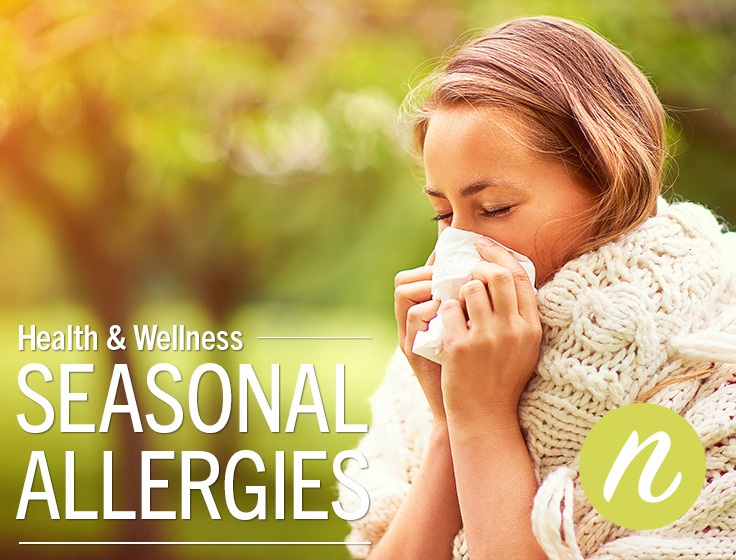Don’t let allergies keep you indoors
Do you struggle with a runny nose or itchy eyes during the spring and summer months? You may have seasonal allergies! Pramod Kelkar, MD, allergy & immunology specialist at Asthma & Allergy Care, shares common causes, symptoms and treatments for allergies this time of year.
Many people don’t realize they have allergies, but instead think they’re suffering from the common cold or a viral infection. While the symptoms can be similar, a fever and body aches are not associated with allergies. And the common cold will go away within seven to 10 days, while allergies last longer.
Allergies are caused by your body overreacting to an allergen. The severity of common allergy symptoms can vary from year to year and include:
- runny nose
- sneezing
- post-nasal drip
- nasal congestion
- sinus pressure
- watery and red eyes
- coughing
More than 50 million Americans suffer from allergies each year, according to the Centers for Disease Control & Prevention. Allergies can happen at any age and you rarely outgrow seasonal allergies. The most common causes of allergies or allergens include:
- pollen*
- dust
- mold
- insect stings
- food
- animal dander
- medications
- latex
*The correlation of allergy symptoms to pollen counts is somewhat tenuous. It is valid in some people but not in everyone.
Treatment
There is no reason anyone should suffer from allergies and deny themselves the pleasure of the outdoors, especially with the short summers we have in Minnesota. There are many over-the-counter (OTC) and prescription treatment options for allergies, and with so many choices, we can control close to 100 percent of allergic conditions.
Many of the medications available OTC today required a prescription just three to five years ago. Medication costs vary greatly, so it’s important to shop and compare prices.
Treatment options include nose sprays, eye drops and allergy pills. One or a combination of these OTC meds can provide relief and control allergy symptoms for most people. Your pharmacist can help you determine the appropriate dose based on your age and symptoms.
Following are the most common OTC allergy meds available today:
- ALLERGY PILLS relieve runny nose, sinus pressure and itchy and watery eyes. The most common brands include Allegra, Claritin and Zyrtec.
- NASAL SPRAYS help with nasal congestion, sneezing and runny and itchy nose. Brands include Flonase and Nasacort.
- EYE DROPS relieve itchy, irritated eyes. The most common brand is Zaditor.
Identify your allergens
If these OTC products don’t provide relief from your allergy symptoms, don’t suffer in silence. Find out what exactly you’re allergic to by visiting an allergy specialist or allergist.
You’ll be tested for a variety of allergens to identify the specific cause of your allergic reaction. An allergist can help you identify ways to avoid allergens and minimize your symptoms as well as more natural ways to control symptoms without medications. For example, using a neti pot to rinse your sinuses with a saline solution can relieve sinus symptoms and triggers before they have a chance to cause inflammation.
I don’t recommend staying indoors in air conditioned rooms to avoid allergens because denying yourself the pleasure of the outdoors is not practical, and there are so many health benefits to being outside.
Allergy shots
Once you identify what triggers your allergic reaction, allergy shots or immunotherapy combine your trigger substances into an injection and slowly desensitize your body to these allergens. Allergy shots are given at regular intervals over three to five years to stop or reduce allergic reactions and train your immune system not to overreact to your triggers.
Insect stings
Most people react to insect stings with swelling and redness that can be managed with ice and Benadryl. But for some, insect stings can cause life threatening reactions like closing of the throat and shortness of breath. If you have a life-threatening or systemic reaction to the venom of honey bees, yellow jackets, yellow hornets, white faced hornets and paper wasps, you should see an allergist for desensitization treatment.
Allergy care
Asthma & Allergy Care Clinics and North Memorial Clinics can help diagnose and treat allergies. To schedule with a primary care provider at a North Memorial Clinic, call 763.581.CARE(2273) or go to northmemorialaccess.com. To schedule with an allergy specialist at Asthma & Allergy Care, call 763-420-1010.
Get online diagnosis and treatment for allergies and other common illnesses at northecare.com






